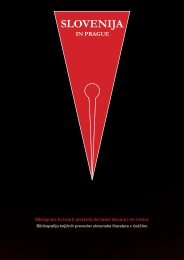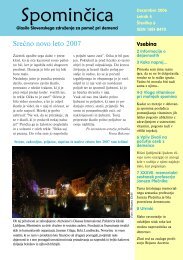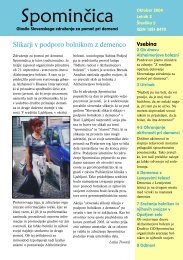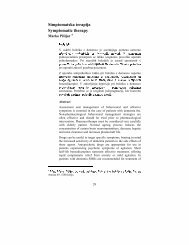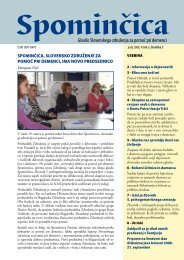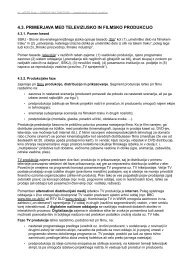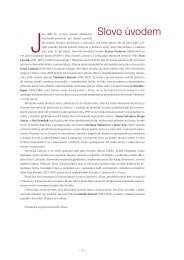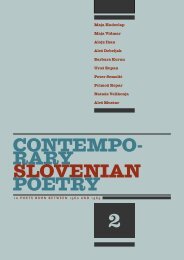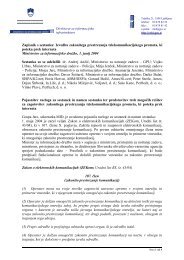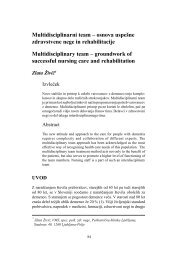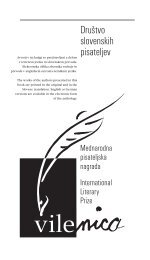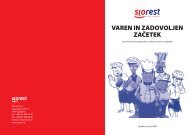Zbornik Mednarodnega literarnega srečanja Vilenica 2003 - Ljudmila
Zbornik Mednarodnega literarnega srečanja Vilenica 2003 - Ljudmila
Zbornik Mednarodnega literarnega srečanja Vilenica 2003 - Ljudmila
Create successful ePaper yourself
Turn your PDF publications into a flip-book with our unique Google optimized e-Paper software.
The sound of the sundial<br />
Excerpt from chapter III. The Route to the Sun<br />
Six months of separation stretched to twenty-two. I was over a year old by the time Dad<br />
came back for us. He got down from the train and went straight to his wife, waiting for<br />
him with a boy in her arms. What went through his head when he saw me for the first<br />
time? Mama several times described how happily he laughed when he set eyes on me.<br />
Maliciously, he denied it every time. He maintained he was devastated because I looked<br />
like a drooling meal-worm. Yes, I did laugh, he used to say, what could I do but laugh<br />
at such a sight. A bald-headed pudding with chubby cheeks and an irresistible smile.<br />
Two big front teeth with a space wide enough for two matchsticks between them. A wellfed<br />
little marmot. And then there was another shock. Rachel. In a white blouse and<br />
sailor's trousers. Hair cut short comme les garcons, the perfect street urchin.<br />
****<br />
A couple of months later, in November '32, we set out together on the route to the sun.<br />
The ship sailed from Marseilles, the Monarch of Bermuda. Lavish evening parties, long<br />
dresses and dancing. A conjuror and a ventriloquist. The English everywhere. How do<br />
you do? Polished manners, and specialities of the chef d'. Rachel had a stomach like<br />
dough in a kneading trough. It rose and rose. Sails bellied in the gathering wind and the<br />
waves grew bigger and more terrifying. The heavens clouded over and the horizon<br />
disappeared. Strings of rain created a visible screen, a veil that drew closer. A<br />
transparent curtain dividing dryness from the terrible spray. Magic. When the first drops<br />
fell on the prow of the ship, the stern still remained dry for some seconds longer. Then<br />
the wall of rain shifted another few metres and swallowed the whole ship. Through this<br />
singular phenomenon the dough in the kneading trough deflated. She completely forgot<br />
she'd ever felt unwell.<br />
That lasted fine while she was on the ship, but in Madras she collapsed. She threw up<br />
for half a day. Maybe the problem was those pills she'd had to take against cholera and<br />
typhus. We reached Calcutta two weeks before Christmas. When, after three days spent<br />
in bed, she unpacked the last things, it was almost dark. She heard him come in the<br />
house. She was waiting in the dining room.<br />
He sat down, reached into his pocket and threw on the table some worn coins.<br />
- This is the currency here?<br />
- Yes. One rupee is approximately ten crowns.<br />
- And they have something like hellers?<br />
- Of course. One rupee has sixteen annas, one anna has four paise and one paisa three<br />
pai.<br />
The dismay showed in her eyes.<br />
- What sort of arithmetic is that?<br />
- One rupee has sixteen annas, sixty-four paise and one hundred and ninety-two pai.<br />
Easy.<br />
- Crazy!<br />
- You'll get used to it. The Indians are proud of it.<br />
- Proud of what?<br />
- Of their arithmetic. The population is counted in khror. Three khror of population<br />
equals thirty million people.<br />
She calculated in silence.<br />
- So one khror is ten million.<br />
54<br />
- Correct. I told you it was easy, didn't I? One kror has a hundred laakh and a hundred<br />
khror is one arb and a hundred arb is one kharb -<br />
- Stop it! I don't want to know.<br />
He put a consoling hand on her shoulder.<br />
- You're going to like it here, you'll see.<br />
She didn't like it in India at all. She saw the dirt, the mouldering walls of the houses,<br />
litter floating in the sludge. It made her feel sick, the putrid stench wafting towards her,<br />
the dozens of curs and cats running around, hairless and mangy. She went into fits<br />
when she saw crippled children lying in the dust of the street, wretched beggars with<br />
elephant foot and a hand stretched out. She suffered from phobias. About dirt and<br />
disease. She couldn't bear the naked face of reality, the raw shape of misery, sickness<br />
and dying. The day she saw her first snake she wanted to go home.<br />
Mother India. Land of an ancient culture, mysterious and inscrutable. Broad rivers of<br />
rolling yellowy-grey water, silent and everlasting. India. ather tried to merge into the<br />
land and extract the best from the tangle of different people, cultures and religions. To<br />
begin with, mother tried to understand the country. Always she sought for meaning in<br />
everything. But then, you should have hated India.<br />
India wasn't going to change on her behalf. India had been like that for thousands of<br />
years. It was Rachel who changed. She came to terms with it. Thanks to her infatuation<br />
with age-old myths, images of faith and by the power of the word, she uncovered for<br />
herself and for us the poetry of the oriental continent, she let herself be carried away<br />
by extremes and by the abundance of destinies. She fell in love with it. India was our<br />
common love. Scorching and relentless, sweet and distressing, sensuous and repellent.<br />
I grew up in the embrace of its contrasts, amongst people who ignited a desire for<br />
harmony with myself in my life. My India. I didn't try to understand it. I loved it.<br />
Kavita. That was the name of my nurse. My ayah. A well-built woman of uncertain age<br />
with eyes like coals and a nose which ran the whole length of her face and whose<br />
aquiline tip touched her full lips. She wore a blue sari, just one strip of material<br />
mysteriously wound python-like round the upper and lower parts of her body. Dozens<br />
of shimmering bangles and chains rang around her in the rhythm of her movement. She<br />
moved like a cat, subtly and fluently. When she walked, her voluptuous body flowed<br />
gracefully as though being poured from one dish into another, changing shape and<br />
returning to its original form. An atmosphere of peace and kindness spread around her.<br />
Ayah means "nurse". She became an indivisible part of our home and an independent<br />
member of our family. With me she spoke a peculiar mixture of English and Hindu, and<br />
I was the only one who understood. Papa laughed at our method of mutual<br />
understanding, but it irritated Mama. Eventually she got used to it and stopped getting<br />
angry, because I was touchingly devoted to Kavita and she - she adored me.<br />
Transport along the Ganges, the flat surface of the river with its steamboats, the street<br />
barber. The drying of cow pats in the streets for fuel, the primitive carts with their<br />
massive wheels, the spindly palms like upturned comets.<br />
or a week Rachel had been struggling with the heat. She couldn't breathe and worried<br />
about her child. Thomas didn't notice the heat. He came home late, worn out by<br />
conflicts with the authorities and by the easygoing workmen on the building site. rom<br />
time to time he made demands she found difficult to accommodate.<br />
- We have to hire a cook.<br />
- Why? I don't want a cook. I can do the cooking myself.<br />
- No you can't. We're in India. We have to have a cook who will do the cooking and<br />
shopping. You can't go alone to the market.<br />
- I'm not putting up with social dictates like that!<br />
55



